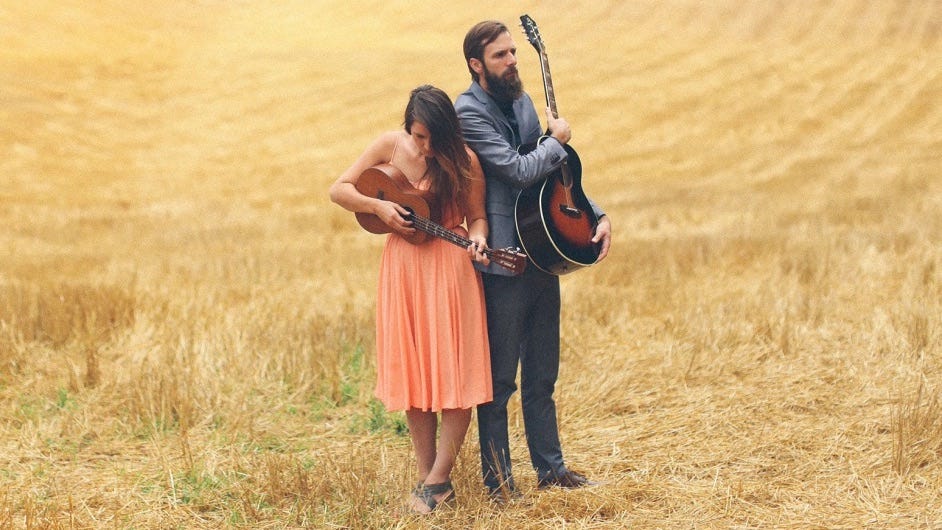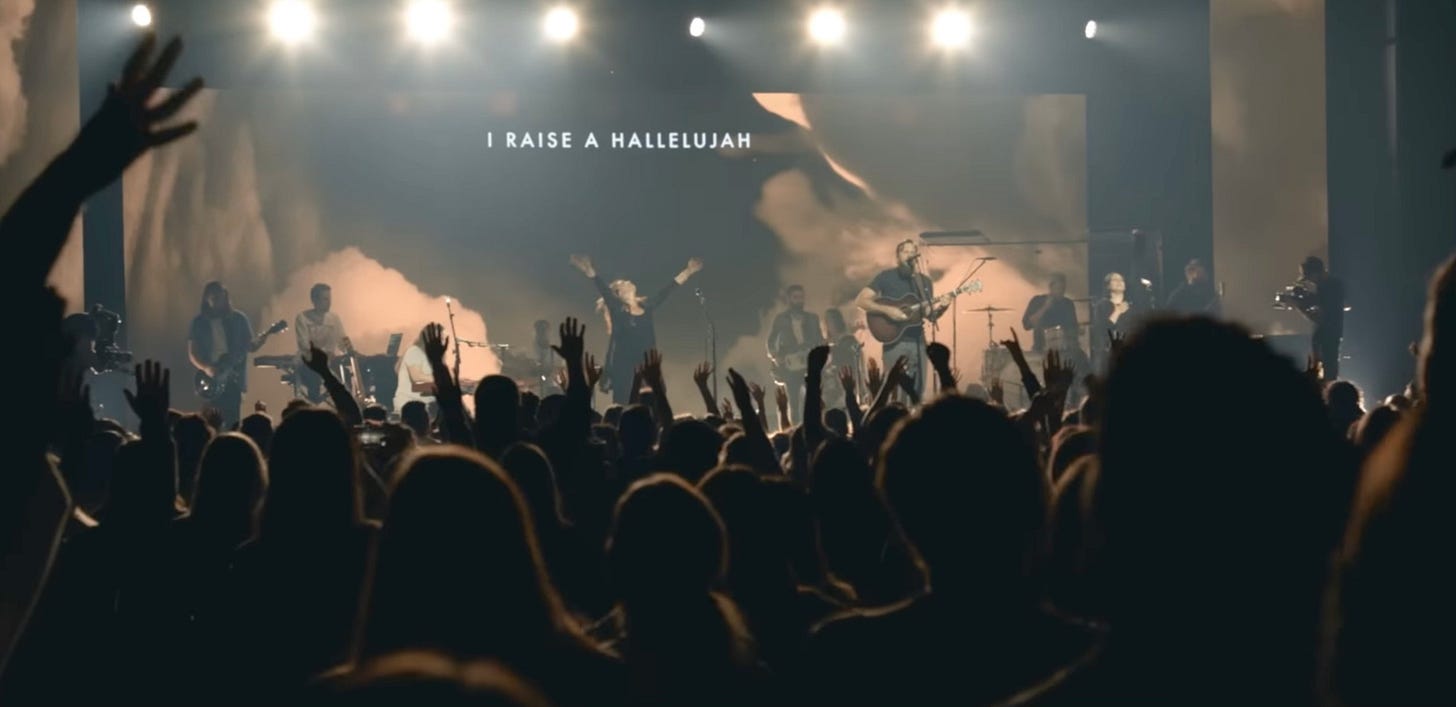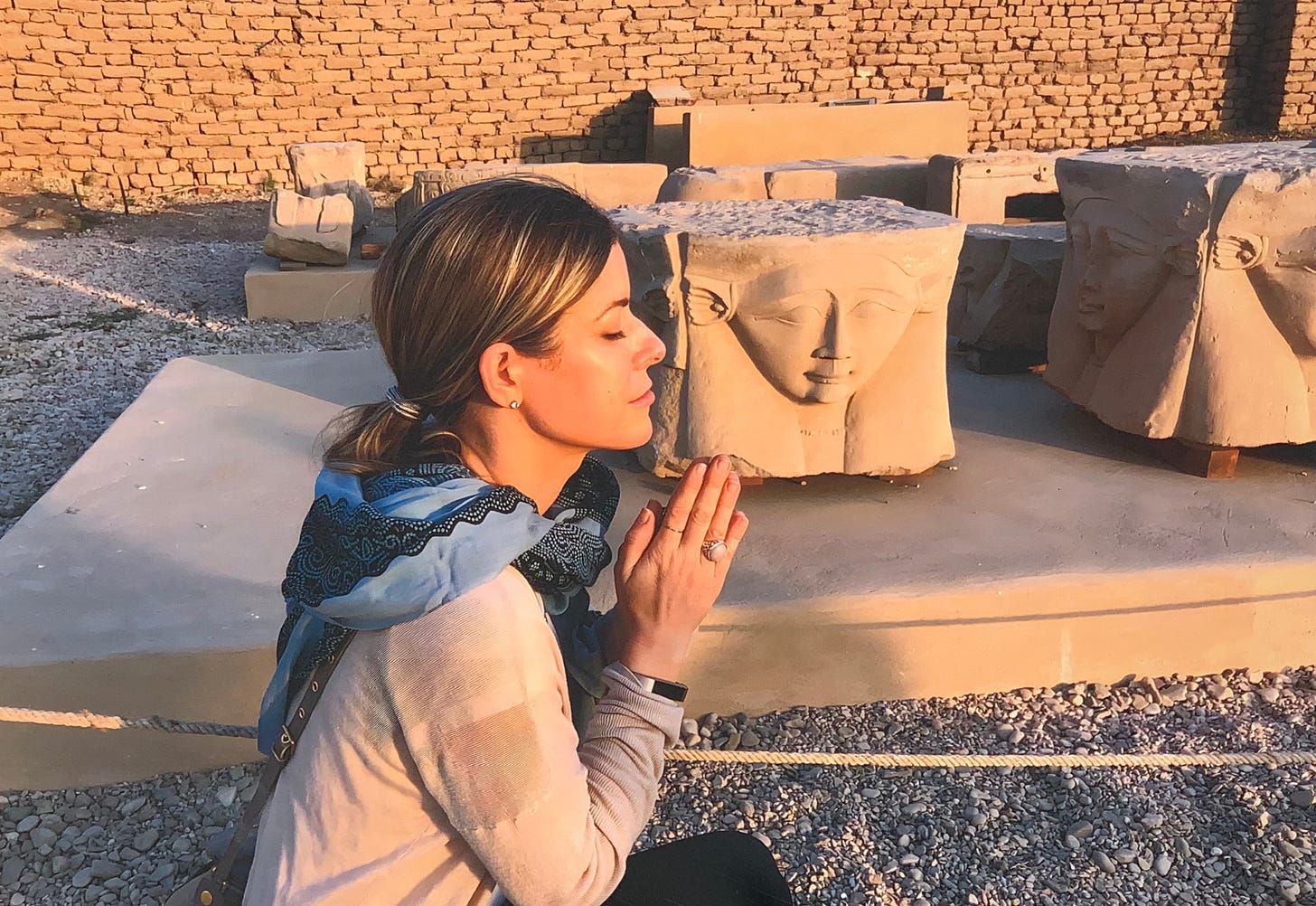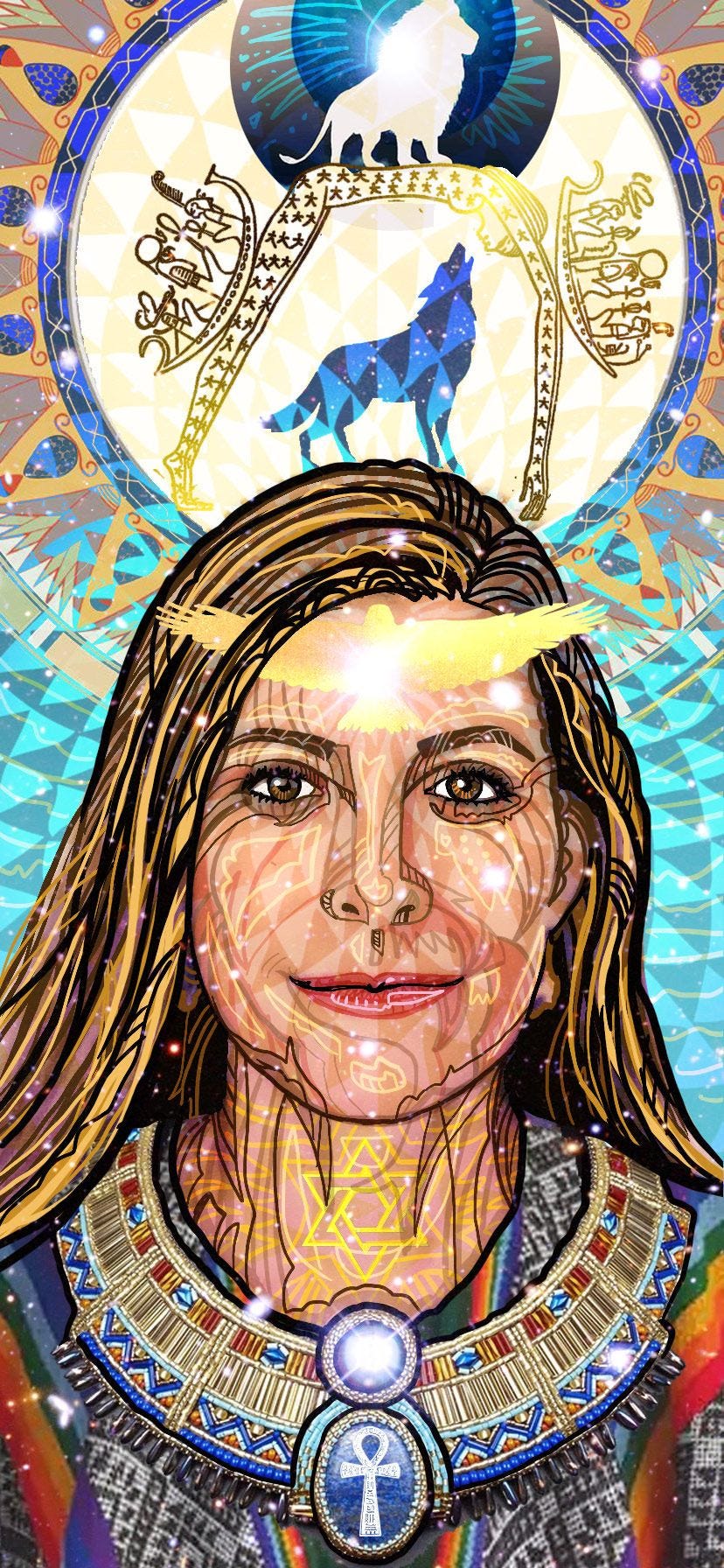Years ago my friends Caroline, Trent, and I started somewhat ironically sending each other Christian rock tracks that we half-liked.
None of us were practicing Christians but we were prayerful people with a taste for a hooky melody and a heart-opening lyric.
It was Caroline who sent on a Bethel Music track called “Raise a Hallelujah” by the husband-wife team Jonathan and Melissa Helser, which I had never heard but in evangelical circles is as big as “Smells Like Teen Spirit.” (The live version, which is the one Caroline sent, has 52 million views on YouTube.)
Helser starts off with a tale of how the song came to be: The child of a dear friend had been sick and he got word that the child, Jaxon, might not live to see the next morning. He sat down to pray and this song poured out of him, fully-formed. And of course: the child lived. (In the video, Jaxon is visibly healthy and perched atop his father’s shoulders in the audience.)
There’s a great story about the Christian songwriter Rich Mullins. A woman approached him after a show and claimed she felt the Holy Spirit moving during his set to which Mullins replied, "You just felt the bass.” I love that story because a) it’s hilarious and b) it addresses the fact that these worship songs are entirely engineered to elevate the hairs on the backs of arms and feel the presence of the Lord.
With “Raise a Hallelujah,” the backstory, the chords, the lyrics and melody, the aching sincerity of the vocal – it all feels, on some level, incredibly manipulative. But it’s also super effective. I listen to it with a kind of bifurcated consciousness. I know I’m being seduced. And I let myself be seduced.
“Raise a Hallelujah” is not a song that rewards repeat listens because there’s nothing enigmatic about it. There’s no code to crack. You get it and love it immediately. It’s just straight up prayer set against the first chords you’d learn on your first day of guitar lessons. Still, it opens something up in me. It makes me believe in miracles.
I raise a Hallelujah
In the middle of the mystery
I raise a Hallelujah
Heaven comes to fight for me
I raise a Hallelujah
My weapon is a melody
I raise a Hallelujah
Louder than the unbelief
But then something else rises up, some cynical eye-rolling voice that says “Okay, this kid lived. But what about the many other sick, prayed-over kids who don’t? Why did God respond to this particular four-chord anthem and spare Jaxon while refusing to spare so many others? Were their parents not friends with enough musicians?"
I know this is wading into the thorniest of theological terrain: “Why does evil exist? Why do bad things happen to good people?” etc. But would believers have responded so passionately to the song had Jaxon not lived? How much of its success is predicated on the song’s apparent miraculous efficacy? On it flattering the belief of the believers?
I suppose my reflection is complicated by the fact that my friend Caroline, who sent me the song, died on January 31 after a long battle with multiple cancers. She was 46.
A few words about Caroline. You would have loved her. I can say this with certainty because everyone loved her. She was an immediate upgrade to any room she entered. Open-hearted, empathetic, bright (in all senses of the word), searching, soulful, quick to laugh, a lover of humans and animals in equal measure. Caroline had pockets of community all over the world and she was central to all of them. Joyful, curious, perpetually open to the new. An unflappable supporter of those she loved. Just a smashingly great human being.
No one worked or fought harder to stay alive than Caroline. I have never seen someone commit to their healing with such focus and ferocity. She intended with the full might of her being to beat this thing and live. And for a time it looked like she was going to.
Caroline united east and west, heaven and earth, surrender and devotion, appeal and action in her healing protocol. She was a deeply prayerful person surrounded by prayerful people. Pleas for Caroline’s healing rose to the heavens from many lips and hearts.
Still, she died. Far far too young.
I’m not going to argue that Caroline's death means that prayer is ineffective or that God is indifferent, uncaring, or absent. But deaths like Caroline’s and the fact of so much suffering and injustice on this planet does nudge one into a deeper level of contemplation when it comes to mercy and healing.
Contemplation is the wrong word. Anger is a better one.
My beloved teacher and friend Richard Rohr has spoken often of the “Santa Claus God.” The old bearded man who grants our wishes depending upon our naughtiness or niceness. Religion as ‘worthiness test.’ He feels this is a childish view of God, one that must be retired if we’re to grow. I agree with him. You live long enough and you see horrible things happen to the kindest, most wonderful people while ethically and morally vacant people get rewarded with earthly riches and success. There seems to be no rhyme or reason to the whole thing. I get this and I very grudgingly accept this.
Yet there remains in me a longing for justice, for righteousness to be rewarded and wickedness to be punished. For the universe to make some kind of moral and ethical sense right now.
I’m reading a tough, eye-opening, and compulsively readable book by Dara Horn called “People Love Dead Jews.” She references a 1965 book by the British literary critic Frank Kermode called “The Sense of an Ending,” wherein the author interrogates what readers want from a story.
“Kermode points out how much readers desire coherent and satisfying endings, and then connects that desire to the history of Western religion… Readers, he says, are like fundamentalists who see everything as a sign from God, because in literature, every detail actually does matter. Just as religion urges us to see our world as an inherently meaningful place where events always serve some larger purpose, writers create that purpose within stories by making every detail add up to something meaningful, thereby inventing a coherent world.”
I get this. I want life to be good literature. For each detail to be meaningful, consequential, and intentionally placed. To trust that we’re being led somewhere and that that destination is good. I don’t want to concede that oftentimes the world is chaotic, unjust, baffling, and seemingly meaningless. That redemption is not an inevitability.
When despair threatens, I try to remember: Life (or God or Reality) is a much better storyteller than I am. There have been plot points in my life that were such wild curveballs, events and occurrences that felt like such narrative missteps at the time that turned out to be the very things necessary for my growth and transformation. I wouldn’t have chosen these things. They weren’t what I wanted, only what I needed.
I get that if my every wish were granted I would be a feeble, entitled creature lacking resilience, empathy, and drive. Still, I get annoyed that the world is so replete with suffering, and that that suffering is non-negotiable.
I have zero evidence for what I’m about to say. It’s just a feeling. And the feeling is this: That at some point – maybe in this life, or at the moment of death, and maybe even post-death – things will make some kind of sense. That any tortured attempts at reasoning will cease and the light of clarity will break through. It won’t be an intellectual clarity. It will be bigger and far more grace-filled than that. A cosmic ‘aha’ moment. An understanding of why things had to be the way they were.
This sense of mine, that there is some ultimate order and meaning in the last analysis, is in no way meant to short-circuit or deny the utility and necessity of grief and anger in the face of loss. I fully support howling at the heavens, raging against injustice, and weeping hot angry tears. These are good and proper responses to the pain and madness of this world.
How are we to exist in a world that is horrifying, unjust, cruel, a world that regularly offends our sense of decency, where children get sick and good people die way too young? Can we hold the paradox that this very same world is also miraculous, rooted in love, and shot through with grace?
I'm not sure. Some days I can. Other days, not so much.
If I could seek Caroline’s counsel on this matter, I have a strong feeling she would urge me to stay the course. To keep my heart open to the mystery. To believe and forgive. To pray with all my might. To make a joyful noise. To raise a hallelujah.
The above portrait was created by my dear brother Jon Marro, who was also a close friend of Caroline's. I love the piece so much. Caroline's spirit shines through so strongly in it.
Here are three charities dear to Caroline's heart if you're moved to make a donation in her memory: My Friends Place, Oceana, and PAWS (Performing Animals Welfare Society)
****
Loved this conversation I had with my buddy Connor Beaton on his ManTalks podcast. We covered so much ground: Addiction, ayahuasca, success, growing up, the archetypes in HIMYM, etc. Check it out.
Your Brain Has Tricked You Into Thinking Everything Is Worse by Adam Mastroianni:
I flipped for the documentary Turn Every Page: The Adventures of Robert Caro and Robert Gottlieb. Just delightful from start to finish.
This track from Feist’s new album is really working for me.
Aarik Daneilsen wrote this lovely piece about my Museletters and Nick Cave's Red Hand Files (If you don't get those you must.) Couldn't ask for better company. And I recently finished listening to "Faith Hope & Carnage." Seán O'Hagan's book of interviews with Nick Cave. It's extraordinary.
The Faith of Gary Haugen: The founder of International Justice Mission found in his religion a source of courage:
How One Mother’s Love for Her Gay Son Started a Revolution: In the sixties and seventies, fighting for the rights of queer people was considered radical activism. To Jeanne Manford, it was just part of being a parent.
Two gems by Craig Thomas, one hilarious (I’m Frank Sinatra, and I’m Perfect for the Role of Tevye), one heartbreaking (Questionnaire)
This Drug Holds Promise for Cult Survivors.
Was honored to have been able to contribute some thoughts to this piece by Eileen Cartter on Paul Newman in the Kenyon Alumni Mag: What Makes a Legend?: Why Paul Newman is having a moment. Again.
Some lovely words from Margaret Renkl: The world is beautiful. People are good.
Take a few minutes to watch Tony Kushner's absolute barn-burner of a speech at the Writer's Strike in NYC.
The revolt of the Christian home-schoolers: They were taught that public schools are evil. Then a Virginia couple defied their families and enrolled their kids.
So I'm 99% sure I'm going to be switching the Museletters from Mailchimp over to Substack. Please keep a look out for the next one so it doesn't end up in your junk mail. I'll also have an option to be a paid subscriber. You absolutely do not have to pay to keep reading. But if you would like to contribute a bit that would be lovely. These take a lot of time, effort, and musing to pull together :)
****
As always, if you're enjoying these please spread the word (people can sign up here) And if you're new to these check out past Museletters. JR










This is such a wonderful piece. I deeply resonate with so much of it, but especially:
“I have zero evidence for what I’m about to say. It’s just a feeling. And the feeling is this: That at some point – maybe in this life, or at the moment of death, and maybe even post-death – things will make some kind of sense.”
I hope for something like this (though the degree to which I’m convinced of it waxes and wanes depending on the day/my mood/whether I've eaten recently). What I know for sure is that lucid, honest writing like yours offers us moments of cosmic clarity; we might not see the whole picture, but important segments are illuminated. Thanks for creating a little bit of sense out of the great and senseless chaos.